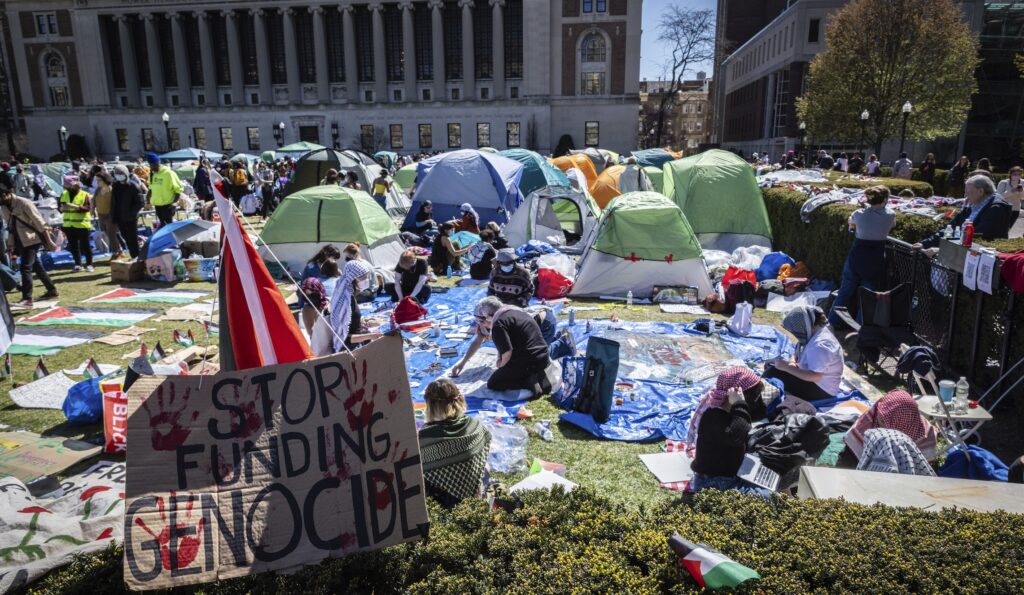A little more than half of California lawmakers received more than $30,000 in tickets to places and events, including Disneyland, a San Francisco 49ers game, and possibly a Taylor Swift Eras Tour concert.
While it is legal for a lawmaker to receive gifts valued up to $590, these findings by Politico raise questions about whether any of these 66 lawmakers may have been influenced by these gifts in their legislative work.
For instance, Democratic Assemblywoman Buffy Wicks introduced a bill in April that would ban exclusive contracts between sellers and venues. This move was prompted by the Taylor Swift Eras Tour ticket sale debacle that unfolded on Ticketmaster’s website, which crashed.
While Ticketmaster’s parent company, Live Nation, blamed the site’s crash on the unprecedented number of people on its server, customers complained of poor service and accused the ticket company of price fixing. The Senate Judiciary Committee held a hearing on the matter in 2023.
Wicks’s bill received the support of third-party resellers, such as StubHub, and consumers, but it wasn’t popular among small artists or small venues and was even opposed by the San Francisco 49ers.
However, Wicks’s bill was subjected to such extensive amendment changes that it lost the support of its original advocate groups.
Democratic Assemblywoman Rebecca Bauer-Kahan, who received concert tickets from the San Francisco 49ers on the same day Swift performed at Levi’s Stadium in July 2023, played a pivotal role in completely reshaping Wicks’s bill. Bauer-Kahan’s former chief of staff, Jordan Curley, had lobbied against Wicks’s bill on behalf of the Music Artists Coalition.
Wicks also received tickets from the 49ers for a game in November, months before the bill was introduced.
The San Francisco 49ers gave the second-largest amount of money in tickets to football games, concert stadiums, and training camps to lawmakers last year.
“Since Levi’s Stadium opened 10 years ago, we have been proud to showcase our home in Santa Clara,” a spokesperson for the 49ers said in a statement. “We regularly extend invitations to a wide variety of leaders, including elected officials from across the Bay Area, to attend events at the stadium and always within the proper guidelines.”
CLICK HERE TO READ MORE FROM THE WASHINGTON EXAMINER
Daniel Schnur, a government ethics expert and former chairman of the Fair Political Practices Commission, said gifts and tickets more often will carry greater influence with politicians than campaign contributions.
“If I send money to a legislator’s campaign account, I get a thank you note. If I attend a reception, I get a handshake. If I take them out to lunch or dinner, I get a conversation,” Schnur said. “But if I get them tickets for a concert or a basketball game, I now have a friend who takes my phone calls.”
2024-08-05 18:17:00, http://s.wordpress.com/mshots/v1/https%3A%2F%2Fwww.washingtonexaminer.com%2Fnews%2Fcampaigns%2Fstate%2F3110900%2Fcalifornia-lawmakers-received-free-tickets-concerns-policy-influence%2F?w=600&h=450, A little more than half of California lawmakers received more than $30,000 in tickets to places and events, including Disneyland, a San Francisco 49ers game, and possibly a Taylor Swift Eras Tour concert. While it is legal for a lawmaker to receive gifts valued up to $590, these findings by Politico raise questions about whether,
A little more than half of California lawmakers received more than $30,000 in tickets to places and events, including Disneyland, a San Francisco 49ers game, and possibly a Taylor Swift Eras Tour concert.
While it is legal for a lawmaker to receive gifts valued up to $590, these findings by Politico raise questions about whether any of these 66 lawmakers may have been influenced by these gifts in their legislative work.
For instance, Democratic Assemblywoman Buffy Wicks introduced a bill in April that would ban exclusive contracts between sellers and venues. This move was prompted by the Taylor Swift Eras Tour ticket sale debacle that unfolded on Ticketmaster’s website, which crashed.
While Ticketmaster’s parent company, Live Nation, blamed the site’s crash on the unprecedented number of people on its server, customers complained of poor service and accused the ticket company of price fixing. The Senate Judiciary Committee held a hearing on the matter in 2023.
Wicks’s bill received the support of third-party resellers, such as StubHub, and consumers, but it wasn’t popular among small artists or small venues and was even opposed by the San Francisco 49ers.
However, Wicks’s bill was subjected to such extensive amendment changes that it lost the support of its original advocate groups.
Democratic Assemblywoman Rebecca Bauer-Kahan, who received concert tickets from the San Francisco 49ers on the same day Swift performed at Levi’s Stadium in July 2023, played a pivotal role in completely reshaping Wicks’s bill. Bauer-Kahan’s former chief of staff, Jordan Curley, had lobbied against Wicks’s bill on behalf of the Music Artists Coalition.
Wicks also received tickets from the 49ers for a game in November, months before the bill was introduced.
The San Francisco 49ers gave the second-largest amount of money in tickets to football games, concert stadiums, and training camps to lawmakers last year.
“Since Levi’s Stadium opened 10 years ago, we have been proud to showcase our home in Santa Clara,” a spokesperson for the 49ers said in a statement. “We regularly extend invitations to a wide variety of leaders, including elected officials from across the Bay Area, to attend events at the stadium and always within the proper guidelines.”
CLICK HERE TO READ MORE FROM THE WASHINGTON EXAMINER
Daniel Schnur, a government ethics expert and former chairman of the Fair Political Practices Commission, said gifts and tickets more often will carry greater influence with politicians than campaign contributions.
“If I send money to a legislator’s campaign account, I get a thank you note. If I attend a reception, I get a handshake. If I take them out to lunch or dinner, I get a conversation,” Schnur said. “But if I get them tickets for a concert or a basketball game, I now have a friend who takes my phone calls.”
, A little more than half of California lawmakers received more than $30,000 in tickets to places and events, including Disneyland, a San Francisco 49ers game, and possibly a Taylor Swift Eras Tour concert. While it is legal for a lawmaker to receive gifts valued up to $590, these findings by Politico raise questions about whether any of these 66 lawmakers may have been influenced by these gifts in their legislative work. For instance, Democratic Assemblywoman Buffy Wicks introduced a bill in April that would ban exclusive contracts between sellers and venues. This move was prompted by the Taylor Swift Eras Tour ticket sale debacle that unfolded on Ticketmaster’s website, which crashed. While Ticketmaster’s parent company, Live Nation, blamed the site’s crash on the unprecedented number of people on its server, customers complained of poor service and accused the ticket company of price fixing. The Senate Judiciary Committee held a hearing on the matter in 2023. Wicks’s bill received the support of third-party resellers, such as StubHub, and consumers, but it wasn’t popular among small artists or small venues and was even opposed by the San Francisco 49ers. However, Wicks’s bill was subjected to such extensive amendment changes that it lost the support of its original advocate groups. Democratic Assemblywoman Rebecca Bauer-Kahan, who received concert tickets from the San Francisco 49ers on the same day Swift performed at Levi’s Stadium in July 2023, played a pivotal role in completely reshaping Wicks’s bill. Bauer-Kahan’s former chief of staff, Jordan Curley, had lobbied against Wicks’s bill on behalf of the Music Artists Coalition. Wicks also received tickets from the 49ers for a game in November, months before the bill was introduced. The San Francisco 49ers gave the second-largest amount of money in tickets to football games, concert stadiums, and training camps to lawmakers last year. “Since Levi’s Stadium opened 10 years ago, we have been proud to showcase our home in Santa Clara,” a spokesperson for the 49ers said in a statement. “We regularly extend invitations to a wide variety of leaders, including elected officials from across the Bay Area, to attend events at the stadium and always within the proper guidelines.” CLICK HERE TO READ MORE FROM THE WASHINGTON EXAMINER Daniel Schnur, a government ethics expert and former chairman of the Fair Political Practices Commission, said gifts and tickets more often will carry greater influence with politicians than campaign contributions. “If I send money to a legislator’s campaign account, I get a thank you note. If I attend a reception, I get a handshake. If I take them out to lunch or dinner, I get a conversation,” Schnur said. “But if I get them tickets for a concert or a basketball game, I now have a friend who takes my phone calls.”, ,  , https://www.washingtonexaminer.com/wp-content/uploads/2024/05/AP24138734809632.jpg.optimal.jpg, Washington Examiner, Political News and Conservative Analysis About Congress, the President, and the Federal Government, https://www.washingtonexaminer.com/wp-content/uploads/2023/11/cropped-favicon-32×32.png, https://www.washingtonexaminer.com/feed/, Elaine Mallon,
, https://www.washingtonexaminer.com/wp-content/uploads/2024/05/AP24138734809632.jpg.optimal.jpg, Washington Examiner, Political News and Conservative Analysis About Congress, the President, and the Federal Government, https://www.washingtonexaminer.com/wp-content/uploads/2023/11/cropped-favicon-32×32.png, https://www.washingtonexaminer.com/feed/, Elaine Mallon,
 , https://www.washingtonexaminer.com/wp-content/uploads/2024/06/iStock-1369167686.jpg.optimal.jpg, Washington Examiner, Political News and Conservative Analysis About Congress, the President, and the Federal Government, https://www.washingtonexaminer.com/wp-content/uploads/2023/11/cropped-favicon-32×32.png, https://www.washingtonexaminer.com/feed/, Elaine Mallon,
, https://www.washingtonexaminer.com/wp-content/uploads/2024/06/iStock-1369167686.jpg.optimal.jpg, Washington Examiner, Political News and Conservative Analysis About Congress, the President, and the Federal Government, https://www.washingtonexaminer.com/wp-content/uploads/2023/11/cropped-favicon-32×32.png, https://www.washingtonexaminer.com/feed/, Elaine Mallon,







